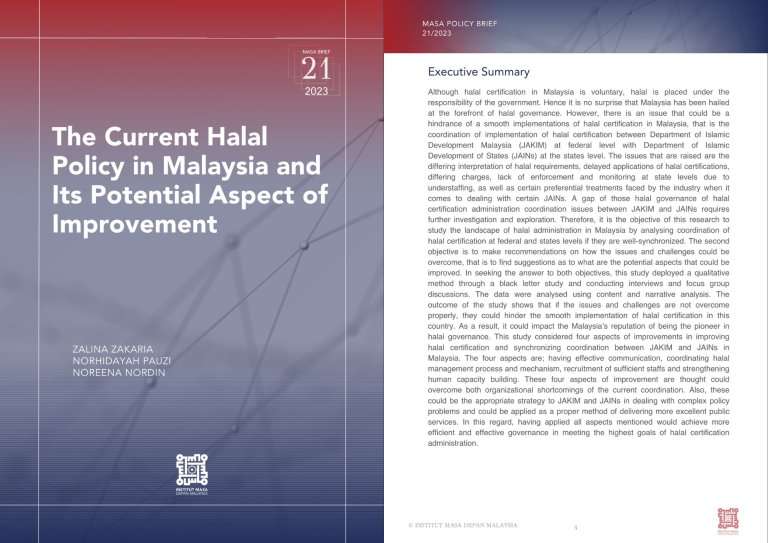Although halal certification in Malaysia is voluntary, halal is placed under the responsibility of the government. Hence it is no surprise that Malaysia has been hailed at the forefront of halal governance. However, there is an issue that could be a hindrance of a smooth implementations of halal certification in Malaysia, that is the coordination of implementation of halal certification between Department of Islamic Development Malaysia (JAKIM) at federal level with Department of Islamic Development of States (JAINs) at the states level. The issues that are raised are the differing interpretation of halal requirements, delayed applications of halal certifications, differing charges, lack of enforcement and monitoring at state levels due to understaffing, as well as certain preferential treatments faced by the industry when it comes to dealing with certain JAINs. A gap of those halal governance of halal certification administration coordination issues between JAKIM and JAINs requires further investigation and exploration. Therefore, it is the objective of this research to study the landscape of halal administration in Malaysia by analysing coordination of halal certification at federal and states levels if they are well-synchronized. The second objective is to make recommendations on how the issues and challenges could be overcome, that is to find suggestions as to what are the potential aspects that could be improved. In seeking the answer to both objectives, this study deployed a qualitative method through a black letter study and conducting interviews and focus group discussions. The data were analysed using content and narrative analysis. The outcome of the study shows that if the issues and challenges are not overcome properly, they could hinder the smooth implementation of halal certification in this country. As a result, it could impact the Malaysia’s reputation of being the pioneer in halal governance. This study considered four aspects of improvements in improving halal certification and synchronizing coordination between JAKIM and JAINs in Malaysia. The four aspects are; having effective communication, coordinating halal management process and mechanism, recruitment of sufficient staffs and strengthening human capacity building. These four aspects of improvement are thought could overcome both organizational shortcomings of the current coordination. Also, these could be the appropriate strategy to JAKIM and JAINs in dealing with complex policy problems and could be applied as a proper method of delivering more excellent public services. In this regard, having applied all aspects mentioned would achieve more efficient and effective governance in meeting the highest goals of halal certification administration.
#21: The Current Halal Policy in Malaysia and Its Potential Aspect of Improvement
- Laporan Dasar, Program Pembangunan Dasar MASA
Kongsi Artikel
Artikel Lain
Siaran Media
KENYATAAN MEDIA MAJLIS PENGANUGERAHAN GERAN PENYELIDIKAN PROGRAM PEMBANGUNAN DASAR MASA (MPDP) 3.0 4...
Artikel
Oleh Nur Zalikhaa’ Zainal Abidin MALAYSIA’S fight against tobacco is entering a troubling...
Artikel
Oleh Muhammad Iman Khidir Tarmidzi TATKALA Malaysia melakar sebuah perancangan jangka sederhana melalui...
Artikel
Oleh Azril Mohd Amin Sejarah membuktikan kestabilan politik dan kemakmuran ekonomi Malaysia adalah...




